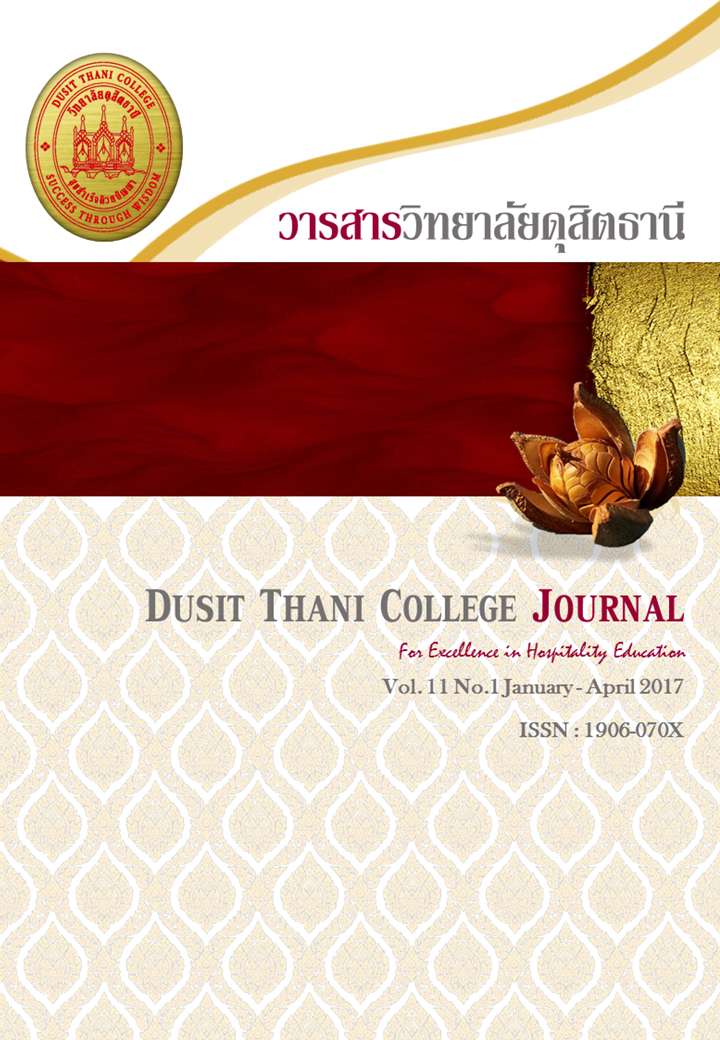Team Working for Increasing Work Effectiveness
Main Article Content
Abstract
Team working is a necessary strategy for increasing of organization working effectiveness. In order to create an effective team working, team members should understand the principal of team working and have team leader who possesses good leadership skills and vision. This article has 3 objective; 1) to review fundamental knowledge related to concepts, theories, and researches on team working for increasing of organization working effectiveness, and 2) to introduce the support that foster team work which are motivation and communication and 3) to introduce a conceptual framework for increasing of organization working effectiveness. The framework might be a useful tool for exploring a novel knowledge regarding working effectiveness increasing by team working. Such framework might be used as a guidance for organization staff development in order to create an effective team working which leads to achievement of desired organization goal.
Article Details
Article Screening Policy
- All research and academic articles to be published must be considered and screened by three peer reviews in the relevant field / article.
- All articles, texts, illustrations and tables published in the journal are the personal opinions of the authors. Editors don't always have to agree. And no responsibility whatsoever is the sole responsibility of the author.
- The articles to be published must never be published. Where did you first publish? And not in the consideration of other journals If the audit found that there has been a duplicate publication It is the sole responsibility of the author.
- Any article that the reader sees as being plagiarized or impersonated without reference. Or mislead the work of the author Please let the journal editor know it will be your greatest blessing.
References
Boottree J.. (2006). Leadership and Team Development. 2nd Published Bangkok: Dhurakij Pundit University.
Prachaya K. (2007). Human resources Management 1st published. Bangkok.
Prasert C.. (2013). The performance optimizing of the Bureau of the Royal Secretariat staff :
A case study of motivation. The Report of Executive diplomacy Training Program. Batch 5th 2013 Devawongwaropagarn international institute. Ministry of Foreign Affairs.
Pranee P. and Team. (2013). Factors affecting regression in job performance of person education in library of art Rajamangala university of technology Phra Nakorn. Bagkok : Art Faculty. Rajamangala Pranakorn university.
Pairote B.. (2008). The skills of team management. Bangkok: Active Print Co.Ltd.
Malika V.. (2010). A Study of the teacher’s team work in the municipal school under the office of Muang Chonburi municipality. Thesis. Education Management: Burapha University
Yongyut G.. (1998). Planning of Human resources policy. Bangkok: Rajabhat Suan Dusit Institute.
Ronnakorn S.. (2014). The Development of Effective Team Model from TQA Awarded Organizations . Thesis. Master of Science (Management Technology) . The Human Resource Development. NIDA.
Ratthanan P. and Surachao U.. (2011). The management of small and medium enterprieses toachieve competitive advantages northern of Thailand. Journal of management sciences 28(1) (January - June 2011).
Vijit A.. (1982). Technique of Relationship. Bangkok : Pikanete Publisher.
Vinit V.. (2008). The Motivation For The Performance Of Public Health Officials In Tambon Level Of Amphor Muang Burapa University. Thesis. Master Degree . Burapa University.
Samarnpong N.. (1997). Effectiveness Of Communication In Telecommunications Franchise Business Between Worldphone Shop Co.,Ltd. And Franchisees. Thesis. Master. Arts (Mass Comunication). Chulalongkorn University.
Soonthorn P.. (2008). The development for team working of the department of education’s staff Thesis. Education Management: Mahasarakham University
Sunantha L.. (2008). Team work creating. 4th published . Bangkok: Hand Made Sticker and design
Suthichai P.. (2013). The importance of Team Working. (online). http://www.uptraining.co.th/index.php/knowledge-2/440-teamwork-importan.html. Searching 2016 Febuary 28 .
Onwipa J.. (2003). Communication Process In Popularizing Siamsquare. Master. Arts (Development Communication). Graduate School. Chulalongkorn University.
Alderfer, C.. (1989). Theories reflecting my personal experience and life dent. The Journal of Applied Behavioral Science, 25 (4), 351-351.
Alderfer, C., and Guzzo, R.. (1979). Life experiences and adults' enduring strength of desires in organizations. Administrative Science Quarterly, 24 (3), 347-361.
Davis K.B.. (1960). The Process of Communication. New York: Holt, Rinehart and Winston, Inc.
Francis, D..
D. Young.. (1979). Improving Work Group : A Practical Manual for Team Building. La Jolla, Calif. : University Associates.
Harrington-Mackin, D.. (1994). The Team Building Tool Kit: Tips, Tactics, and Rules for Effective Workplace Teams. New York: New Directions Management Services.
Herzberg, Frederick and others. (1959). The Motivation to work. New York : John Wiley and Sons.
Jackson, Susan E.; Brett, Joan F.; Sessa, Valerie I.; Cooper, Dawn M.; Julin, Johan A. and Peyronnin, Karl. (1991). Some Differences Make a Difference: Individual Dissimilarity and Group Heterogeneity as Correlates of Recruitment, Promotions, and Turnover. Journal of Applied Psychology. 76 (October): 675-689.
Katzenbach, J. R. and Smith, D. K.. (1999). The Wisdom of Teams. New York : Harper Collins.
Lasswell, H.D. (1948). The communication of ideas. New York: Harper and Brother Publishers.
Manz, C. P. and Sims, H. P.. (1993). Business without Bosses: How Self-Managing Teams are Building High-Performing Companies. New York: John Wiley and Sons.
McClelland, David C.. (1961). The Achieving Society. New York : D. Van Nostrand Company Ine.
McCroskey,J.C. and Richmond, V.P.. (1997). Fundamentals of human communication: An interpersonal perspective. Prospect Heights, IL: Waveland Press.
Mayo, Elton. (1933). The Human Problems of an Industrial Civilization. New York:Macmillan,p.71
Parker, G. M. (1990). Team Players and Team Work : The New Competitive Business Strategy. San Francisco, Calif. : Jossey – Bass.
Rogers, C.R. (1969). Freedom to learn. Columbus : Charles E. Merrill Publishing Co.


